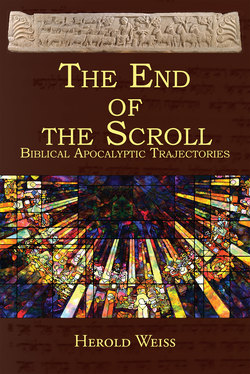The End of the Scroll

Реклама. ООО «ЛитРес», ИНН: 7719571260.
Оглавление
Herold Weiss. The End of the Scroll
Отрывок из книги
Praise for The End of the Scroll
Herold Weiss’ The End of the Scroll offers non-specialists a highly readable and impeccably researched study of biblical apocalyptic literature. Drawing on a lifetime of scholarly immersion in biblical literature, Weiss traces the history of apocalyptic thought, its rise in ancient Israel and its endurance over centuries among Jews and Christians of antiquity. Biblical writers recycled the counsel of their predecessors by refashioning the old to meet the new in response to tragic human conditions in their own time. Weiss’s account of these ancient reinterpretations moves through the biblical books from Israelite prophets to the Book of Revelation, rewarding the reader again and again with illuminating insights. He also provides a very helpful analysis of the use of biblical apocalyptic texts by subsequent generations, from scholars in Renaissance Rome to twenty-first century evangelical interpretations of the signs of the times. In almost every case, these later interpreters have misunderstood the intent of biblical apocalyptic thinking by assuming that its purpose was to predict the future. The ancient apocalypticists, Weiss argues, were not invested in predictions. They described their hopes for God’s future in order to encourage the faithful in the present, not to foster obsession with timetables. Weiss invites his readers to recover this original intent of the biblical apocalyptic imagination by using their own imaginations to encourage faithful living in the present. Any student of biblical literature who is interested in the historical development of apocalyptic and its interpretation will be richly rewarded by this book.
.....
The apocalyptic authors were dealing with a new, different situation because God’s judgment of his people had taken place at the Exile. Their agenda was to interpret the present for people who were in Exile, or were ruled by foreigners while living in their land. They were not addressing a people who enjoyed political and military stability and prosperity by abusing the weak among them. It was not that the prophecies of the prophets were unfulfilled, but that the present conditions were totally different from the ones in which their fathers lived. Thus, while the prophets pleaded for a change of course so that the coming punishment could be avoided, and the future could be the establishment of a restructured, purified present, the authors of apocalypses foretold a future that would break into the present and destroy it. For them, the future could not be a continuation of the present, not even a purified one. The difference in their perceptions of the future was caused by their different evaluations of the nature of history. Both the prophets and the authors of apocalypses had a negative view of the present. The prophets thought that the present could be salvaged because they understood that the future was open. If the people repented, God could change his mind. If they experienced suffering, it had been caused by the sins of their fathers. The apocalypticists could not see a happy future coming out of a chaotic present; conceived as chaotic especially from the perspective of individual identity. According to them, the present had no future because their suffering made no sense.
Like the prophets, the apocalypticists understood the connection between human beings and their God to be in history, but unlike the prophets the apocalypticists understood that the future was predetermined rather than open. According to the prophets, the Israelites needed to reconsider their course of action. If they continued as they were going, the future was bleak, but if they changed course and turned to the Lord, God was more than willing, in fact he was anxious, to relent from his anger and “love them deeply.” Thus the prophets admonished the people to repent. If they did so, God knew how to forgive and forget. Their sins will be buried in the depths of the sea.
.....